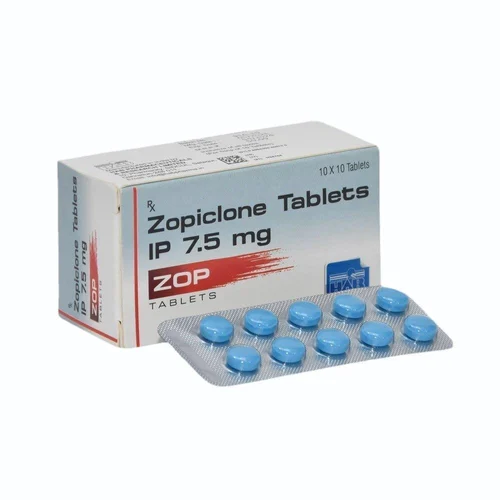
Insomnia and associated sleep disorders plague millions of individuals worldwide, even though sleep is indispensable for maintaining optimal health. In such instances, medications such as Zopiclone Tablets are frequently prescribed to help regulate sleep patterns. Zopiclone is classified as a hypnotic or sedative-hypnotic medication, which functions by promoting restful sleep and soothing the brain.
This comprehensive manual delineates all pertinent information regarding Zopiclone Tablets, including their dosage, potential adverse effects, precautions, and safety concerns.
Zopiclone Tablets are prescription-only medications that are frequently employed to alleviate short-term insomnia. Sometimes referred to as “Z-drugs,” they are a member of the non-benzodiazepine hypnotics group. Although Zopiclone has a slightly different chemical structure from benzodiazepines, it produces similar soothing effects on the brain.
Brand Names: Zimovane, Imovane, and other generics.
Strengths available include 3.75mg, 7.5mg, and occasionally 10mg, contingent upon country regulations.
Tablets coated with film, administered orally.
Zopiclone functions by interacting with gamma-aminobutyric acid (GABA) receptors in the brain. GABA is a neurotransmitter that is naturally produced and can reduce brain activity and induce relaxation. Zopiclone Tablets facilitate the following by augmenting the efficacy of GABA:
Decrease the duration of time it takes to fall unconscious (sleep latency).
Boost the overall duration of slumber.
Enhance the quality of sleep and minimise the frequency of nocturnal awakenings.
Encourage the development of a deep, restful slumber.
Zopiclone is particularly effective for individuals who experience difficulty falling slumber, frequent waking during the night, or early morning awakenings.
Zopiclone Tablets are typically prescribed by physicians for the short-term treatment of:
Insomnia (difficulty falling or remaining unconscious).
Sleep disturbances associated with jet lag.
disturbances that are caused by temporary tension or anxiety.
Sleep disorders among shift labourers.
It is crucial to recognise that Zopiclone Tablets are not a permanent solution to insomnia. They are designed to serve as a temporary solution while lifestyle and behavioural modifications are implemented to enhance sleep naturally.
The dosage is contingent upon the patient’s age, health status, and response to the treatment. The following are general suggestions
Zopiclone commences its action within 30 minutes of ingestion. The majority of individuals experience fewer nocturnal awakenings and fall asleep more quickly. It is suitable for overnight sleep, as its effects typically last for 6–8 hours. However, it is not advised for those who need to rise in a few hours.
Zopiclone, like all medications, may induce adverse effects. The majority are moderate and improve as your body adjusts.
A metallic or bitter flavour in the mouth.
Dry pharynx.
Drowsiness or grogginess the following day.
Dizziness or headache.
Memory impairments.
Weakness of the muscles.
Confusion or fluctuations in temperament.
Digestive disorders (vomiting, vertigo).
A severe allergic reaction: difficulty inhaling, swelling, and rash.
Unusual conduct or hallucinations.
Symptoms of dependence or withdrawal that occur abruptly upon cessation.
Sleepwalking or engaging in activities while not completely awake.
The potential for dependence is one of the most significant concerns associated with Zopiclone Tablets. The medication’s efficacy may be diminished as a result of long-term use or misconduct, and withdrawal symptoms may occur if the medication is abruptly discontinued.
Insomnia that returns.
Irritability or anxiety.
Anxiety.
Sweating or tremors.
Seizures are observed infrequently.
Tip: To prevent withdrawal, physicians typically advise tapering the dosage progressively rather than abruptly ceasing it.
Zopiclone treatment is not appropriate for all individuals. Please notify your physician if you have:
Kidney or liver disease.
Respiratory complications (e.g., asthma, COPD, sleep apnoea).
Substance abuse history (including alcohol, narcotics, and sedatives).
Anxiety, depression, or other mental health conditions.
Breastfeeding or pregnancy.
It is hazardous to combine Zopiclone Tablets with alcohol. The central nervous system is depressed by both substances, which increases the likelihood of:
Perplexity.
Breathing difficulties.
Potential for accidents and overdose.
You should never consume alcohol while taking Zopiclone.
Zopiclone may interact with other medications, potentially increasing the sedative effects or resulting in complications. Inform your physician if you are currently taking:
Antidepressants (SSRIs, tricyclics).
Antipsychotics.
Opioids are potent pain relievers.
Antihistamines.
Additional tranquillisers or sleep medications.
Safely Consuming Zopiclone Tablets
Adhere to the prescribed dosage without deviation.
Do not exceed a two- to four-week duration.
If you experience drowsiness, refrain from operating an apparatus or operating a vehicle the following day.
Keep tablets out of the grasp of children.
Keep in a cold, dry location that is not exposed to sunlight.
Although Zopiclone is effective, it should not be the sole solution to sleep problems. Alternatives consist of:
Consistent exercise, caffeine restriction, and a consistent sleep schedule.
The gold-standard non-drug treatment for insomnia is cognitive behavioural therapy (CBT-I).
Melatonin, herbal supplements (valerian root), or prescription alternatives are examples of additional medications.
False. In order to prevent dependence, it is recommended that it be used for a brief period of 2–4 weeks.
It has a half-life of 5 hours, but its effects can persist for up to 8 hours.
Refrain from operating a vehicle until you are certain that you will not be fatigued the following day.
Certainly, dependence can develop as a result of prolonged use. You must adhere to the instructions of your physician.
Indeed, but only from pharmacies that are legitimate and licensed and have a valid prescription. Be cautious of websites that sell counterfeit medications without proper regulation.
Zopiclone Tablets are effective in the treatment of short-term insomnia, enabling users to fall asleep more quickly and remain asleep for a prolonged period of time. Nevertheless, it is imperative to consume them responsibly, under medical supervision, and for a limited time to prevent dependence and adverse effects.
Consult your physician for a personalised treatment plan, which may involve alternative medications, lifestyle adjustments, or behavioural therapy, if you are experiencing persistent sleep problems.
You can make informed decisions about your sleep health by comprehending the benefits and risks of Zopiclone Tablets and the mechanism by which they operate.
| Quantity | 10, 20, 30, 40, 50, 60, 70, 80, 90, 100, 14, 28, 42, 56, 84, 98, 112 |
|---|
Welcome to The Sleeping Pills, your trusted online destination for all your pharmaceutical needs!